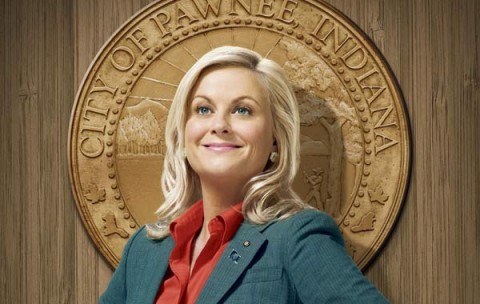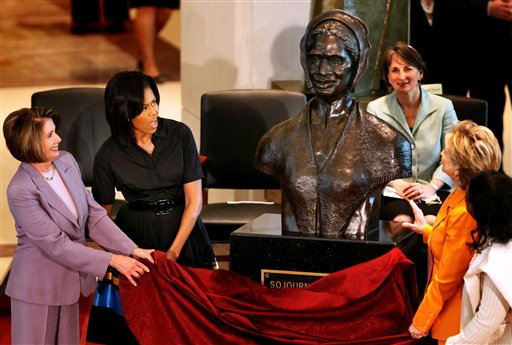Gender
We’ve Come a Long Way, Maybe: Women’s History Creates the Future
“If women want any rights more than they got, why don’t they just take them, and not be talking about it.”
— Sojourner Truth, 1797-1883. Former slave, abolitionist,
women’s rights activist, Methodist minister.
Truth’s admonition seems archaic now. Why are we still “talking about it?”
Is women’s history of struggle for equal rights relevant in a world where women have outpaced men in earning college degrees, equaled their numbers in the workplace, and snatched the family purse to make 85% of consumer purchases?
Since “The End of Men” has been declared and women dubbed “Mistresses of the Universe” shouldn’t young women today, at least those in the industrialized world, feel powerful enough to be and do anything they want?
And shouldn’t more sympathy go to men these days, as the current efforts to gain acceptance for a men’s rights movement have suggested?
Read MoreInspiring Black HERStories
February is Black History Month and March is Women’s History Month. This post by Catherine Engh ties the two together in historical context with links to some amazing but little-known women’s stories. Wow. Feel free to add stories of other such women in the comment section.
And be sure to check back here often as I continue my annual Women’s History Month tradition of highlighting many amazing women—some well known and others not—who have shaped our history. And as you know, No Excuses Power Tool #1 is “Know your history and you can shape the future of your choice.”
Janell Hobson, blogger, social critic and professor of women’s studies, spotlights the lives of various fierce black women throughout history this February on Ms. Magazine’s blog. Hobson’s fascinating posts take as subject black female vocalists, vanguards of the second-wave feminist movement, jazz-age expatriates in Paris, fugitive slaves, civil rights organizers and contemporary environmental justice advocates.
Who knew about Sookie, a slave woman who resisted rape by pushing her master into a soapbox filled with boiling water?
Read MoreGood Move, MSNBC: Buchanan’s Out, Harris Perry’s In
Was MSNBC wrong to move Pat Buchanan out? I think that’s good news, but the better news is that Melissa Harris Perry is moving in. I had the pleasure of doing a practice run with her recently and look forward to the launch of her show this weekend. Vigilant media advocacy for fair treatment by groups like the Women’s Media Center (where I’m on the board) does pay off eventually.
Arena asks: Was Pat Buchanan’s Firing Fair?
My response: It’s time for these men, like Pat Buchanan, Foster Friess, and Rick Santorum to climb back under the prehistoric rock from whence they came.
Read MoreFierce and Female: A Self-Defense Expert Challenges Women To Define What is Non-Negotiable
We often think of power as being a concept that is disembodied and theoretical. But it’s also very physical.
I previously posted here about Ellen Snortland, whose book, Beauty Bites Beast, about the psychological value as well as the physical importance of women becoming proficient at self-defense I always recommend to my students when I teach Women, Power, and Leadership.
Now comes Dr. Ruthless with yet more practical tools for what she refers to as the “Killer Instinct…to preserve and protect life.” And, she says, women need to forge their fear into fire. Read on…and share your experiences with physical fear and strength.
Q&A With Dr. Ruthless on her “Dharma of Defense” and Why we Must Venerate the Warrior Spirit

What happens when you combine primal self-defense methods with the insights of a psychotherapist and the heart of a warrior?
Meet Dr. Ruthless, also known as Melissa Soalt. An award-winning women’s self-defense expert and Black Belt Hall of Fame recipient, Dr. Ruthless emerged at the forefront of the women’s self defense movement in the mid 1980’s and has created her own “Dharma of Defense.” You can see her in action in her acclaimed DVD, Fierce & Female.
Her teachings encompass the physical and spiritual dimensions of self-defense. She unabashedly advocates for women to leverage their Killer Instinct —not for the sake of destruction, but to preserve and protect life. In this interview, Dr. Ruthless shares her perspective on the female warrior spirit and why we must learn to mobilize our survival instinct and forge fear into fire.
Brooke Axtell: What attracted you to training in self-defense and teaching other women how to defend themselves?
Dr. Ruthless: In my late teens, I lived in the Middle East and traveled around Asia. I was attacked multiple times and violently groped. I learned I was a scrappy bitch. I successfully fought off rape attempts in Israel and Pakistan and I suffered a lot of indignities. Women who have been violated know what it’s like to be reduced to anti-matter. It’s utterly dehumanizing. I also witnessed appalling inequities, the ways women are controlled by men. This birthed my undying reverence for female disobedience and the need for women’s self defense.
Read MoreShe's doing It: Catherine Engh Wants More Female Characters Like Leslie Knopes
Catherine Engh is a feminist and an aspiring writer particularly interested in the ways that girls and women are represented in fiction and television. She wrote this piece for 9 Ways–it’s a great example of No Excuses Power Tool # 8: Employ Every Medium. Plus there are some useful tips on how to be a media activist.
Catherine also likes to do as much yoga as is possible–perhaps she’ll write about that next.
Why Television Needs more Leslie Knopes
Recently, I couldn’t help but notice that many of my favorite television shows are about men. Don Draper, Nucky Thompson, Walter White, Hank Moody and Vincent Chase are just a few male lead roles that come to mind.
It is not news that stories about the identity struggles of white men sell. Thus, they are more commonly aired than shows that explore women’s lives and choices. Though women are more likely to watch entertainment programming than men, the majority of those involved with television creation are male. Women’s Media Center reported that in the 2010-2011 year,
Read MoreWill the GOP win the birth control fight?
My response to the question above. What’s yours?
If President Obama caves to the Catholic Bishops on contraceptive coverage, especially on the heels of his recent caving on Plan B emergency contraception, he is toast with the wide spectrum of progressive and middle-of-the-road women who elected him.
If he, on the other hand, engages this controversy wisely, he can recast the debate over contraception properly into one about women’s moral and human right to make their own childbearing decisions, as well as one essential to the health of women and children. In so doing, he will be a hero to the 99% of American women, including 98% of Catholics, who use birth control at some time during their lives to responsibly plan and space their children. And well over 75% believe that contraceptive coverage should be mandated in insurance coverage, as it currently is in 28 states and the Federal employees health plan, in addition to being the standard of care in health insurance in general.
The right is trying inaccurately (deviously?) to create a religious freedom issue with a dash of the dreaded abortion debate thrown in for good measure. Let’s get this straight: no one is trying to force religious institutions that primarily serve their own flock to do anything against their consciences. Those institutions are free to do whatever their faith dictates.
Catholic schools serving primarily Catholic students with primarily Catholic staff using private money are different from large public institutions such as hospitals that are run by Catholics but serve a broad range of the taxpaying public with a broad religious spectrum of staff and use billions of federal dollars to do so (think, Medicare, Medicaid, Federal program and research grants, etc.). Those institutions should no way be exempt from providing contraceptive coverage because they are essentially secular institutions despite being stewarded by religious orders.
But look further behind the curtain, the Bishops and anti-women’s rights members of congress are trying to roll back the clock FOR ALL THE REST OF US on existing laws that rightly require health plans to cover contraception if they cover other prescription drugs.
We women are the 99% on this one, and we’d better speak up or we are in great danger of losing all the hard fought gains that were made during the last two decades to include basic contraceptive care in health plans. It’s only fair, and it’s the standard of good health care to boot.
Read the original post on Politico Arena here.
Read MoreShe's Doing It: Merle Hoffman – "It Takes Bad Girls to Get Good Things Done"
Often when I speak about No Excuses, I ask “When did you know you had the power to __(fill in the blank)___?”
This question intrigues people, but rarely does anyone have as clear and direct answer as Merle Hoffman, this week’s “She’s Doing It.” She seems to have been born knowing, and born quite willing to buck the norm of being the archetypical nice and compliant “good girl” in favor of getting done the things she believes are important.
Merle, the President and CEO of Choices Women’s Medical Center, has recently published a memoir I highly recommend, Intimate Wars: The Life and Times of the Woman Who Brought Abortion Out of the Back Alley and Into the Boardroom.
Merle was kind enough to answer some questions about her life and times for 9 Ways:
Tell me your personal story…why and how did you come to be doing what you a doing?
I really fell into it serendipitously. My early years and adolescence were spent preparing to become a concert pianist. After I graduated from Music and Art, I also dabbled in painting and drama. When I finally decided to go to college at the age of 22, I need three part time jobs to pay for tuition—and one was with an internist , Dr. Martin Gold, for whom I worked as a medical assistant. At just this time (1970), abortion was decriminalized in New York which was three years before Roe v. Wade legalized abortion nationally. Dr. Gold, one of the architects of HIP, wanted to start a service for women subscribers. I got involved in the beginning of this project and it has become my life’s work.
What motivates you? What’s your passion?
I am motivated by very deep feelings of responsibility which began with the first patient who came to Choices.
Read MoreWomen See Red, Get Over Komen Pink, and Embrace Power
This commentary was published yesterday on the Daily Beast with the title “Komen Incites Women’s Tahrir Square Moment.” If you haven’t read it there, please hop on over and give me a share, stumble, and/or comment. There’s quite a lively conversation going on. Then come back and tell me what you think here.
Mostly, I’d like to start a conversation about taking the great passion this kerfluffle between Komen for the Cure and Planned Parenthood has generated and catapult it into a more vibrant, durable, and most of all proactive women’s movement. Clearly, the huge outpouring was about more than the two organizations themselves. There was a lot of pent up readiness for activism and just plain demanding respect as women–as persons–with brains, hearts, and moral autonomy–not as subjects of society’s political whims or social narratives that we did not write.
Let me get off my soapbox and let you read on….
“I am off to feed my daughter (with breasts that were examined by Planned Parenthood doctors when I had no health insurance).”
Allie Wagstrom, a young mom in Minnesota whom I know only via Facebook, posted this on my page after she heard the Susan G. Komen for the Cure Foundation, parent of the ubiquitous pink-ribboned “Race for the Cure,” bowed to political pressure from the right and announced last week that it would no longer fund breast exams and breast health education at Planned Parenthood clinics. Komen’s astonishingly sloppy handling of the situation (for which they have now apologized and semi-retracted) put a black mark in indelible ink on their sweet pink ribbons.
Planned Parenthood supporters demonstrated following a press conference by U.S. Sen. Patty Murray (D-WA) outside at a Planned Parenthood Clinic on Feb. 3, 2012 in Seattle, Washington., Stephen Brashear / Getty Images
Facebook popped a picture of Cynthia Nixon, the lead actor in the Broadway drama about ovarian cancer, Wit, next to Allie’s comment in an advertising tactic. Nixon’s bald head and gaunt face shocked the breath out of me, while social media exploded with the wrath of millions of women who felt scorned by a charity for which they had raced and purchased pink products they didn’t need.
Why this outpouring, even from women who had never openly supported Planned Parenthood?
Read MoreAnother Year of the Woman? Really?
There was a short piece in Monday’s USA Today saying that 2012 is shaping up to be another “Year of the Woman.” And they did have some very good news numbers to back that notion:
…a notable number of candidates are running in potentially competitive races in both the House of Representatives and Senate that could send a wave of female lawmakers to Washington in November. If so, it would reverse the 2010 election trend that saw the first dip in female representation in the House since 1978 and only sent one woman, New Hampshire Republican Kelly Ayotte, to the Senate.
In the 2012 Senate lineup, there are 10 female candidates — four Republicans and six Democrats — seeking office. Of the six states with female Democratic candidates — Connecticut, Hawaii, Massachusetts, Nevada, North Dakota and Wisconsin — none has ever elected a woman to the Senate.
Republican women are running in Connecticut, Hawaii, Missouri and New Mexico.
I want to believe, oh how I want to believe. These numbers, though inching up, still represent a mere fractional increase—even if all of them are elected—a probability somewhere around that of hell freezing over.
At the rate we have been going for the last 20 years and since the first “Year of the Woman” in 1992, it will take 70 years to reach gender parity in Congress.
Read MoreSettling the Score: Dorothy Seymour Mills Finally Tells Her Story
“Everyone assumed that he had done all that work by himself — that’s what he wanted them to assume, but we were equal partners” –Dorothy Seymour Mills
- Photo source: Dorothy Jane Mills
Dorothy Seymour Mills is one of the great baseball historians of all time. But you probably never heard of her.
Instead, she worked alongside her late husband, Harold Seymour. From 1960-1990; he received all the credit and did become famous in his field. Together they completed three of the earliest and most widely read books on baseball history.
First in the Field is Dorothy’s belated claim to her own life’s work. In it, she reveals her approach to baseball history, pervasive attitudes about woman interested in baseball, her reasons for finally demanding the credit she deserves so late in life and her struggle for recognition after her husband’s death.
The short eBook reads more like a research paper than a memoir. But then, the author is after all first and foremost a historical researcher. First in the Field moves through her personal and professional history much as an encyclopedia entry might, chronologically from fact to fact, event to event. Readers will not find much in the way of literary language: Dorothy’s narrative is told without literary flourish or thematic subtlety.
Yet despite the stylistic simplicity, or perhaps because of its straightforwardness and lack of pretense, the story will tug at the heartstrings of anyone who has experienced discrimination. And in recognition that one’s personal story is also political, Dorothy ties the personal injustices she faced to the widespread marginalization of women
Read More
